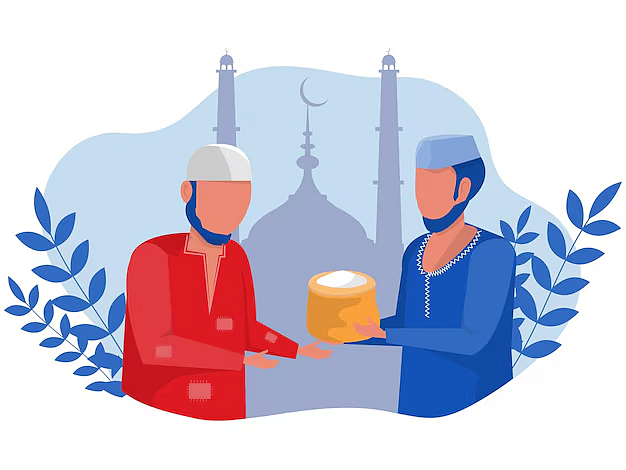Ramadan, the ninth month of the Islamic calendar, is a time of profound spiritual reflection, self-discipline, and heightened devotion. While fasting from dawn to dusk is the most visible aspect of Ramadan, the month is deeply interwoven with the principles of charity, mainly through the obligatory act of Zakat and the voluntary act of Sadaqah. These acts of giving are not merely encouraged during Ramadan; they are amplified in their importance, contributing significantly to individuals' spiritual growth and the community's welfare.
This article delves into the significance of Zakat and Sadaqah within the context of Ramadan, exploring their meanings, purposes, and profound impact on both the giver and the receiver.
Understanding Zakat: Obligatory Charity as a Pillar of Islam
Zakat, often translated as "purification" or "growth," is one of the five pillars of Islam. It is a mandatory form of charity levied on specific assets exceeding a minimum threshold, known as the Nisab. This annual obligation is a significant mechanism for wealth redistribution within Muslim communities and ensures that the needy are taken care of.
Key Aspects of Zakat:
Zakat, a mandatory pillar of Islam, is a divine obligation for financially capable Muslims, not merely a suggestion, with failure to fulfill it considered a sin; it serves to purify wealth, fostering detachment from materialism and promoting generosity, while promising growth and blessings through wealth circulation; furthermore, Zakat reinforces social justice by redistributing wealth to address inequality and ensure necessities for the less fortunate; it is only applicable to wealth exceeding the Nisab, equivalent to the value of 85 grams of gold or 595 grams of silver, with a standard calculation of 2.5% on eligible assets like cash, savings, and investments, though livestock and agricultural produce have distinct calculations.
The Quran outlines eight distinct categories of eligible Zakat recipients: the impoverished (Al-Fuqara), those in acute need (Al-Masakin), Zakat collectors (Amilin 'Alayha), individuals whose hearts are to be won over (Mu'allafatul Qulub), those burdened by debt (Al-Gharimin), those striving in the path of Allah (Fi Sabilillah), travelers in need (Ibnus Sabil), and those to be freed from slavery (Fir-riqab).
Why Zakat is Emphasized During Ramadan:
Ramadan is a month of intensified spiritual activity, and the rewards for good deeds are believed to be multiplied. Therefore, giving Zakat during Ramadan is seen as a way to maximize spiritual benefit and gain a greater reward from Allah. Furthermore, the spirit of empathy and compassion that permeates Ramadan naturally encourages Muslims to be more mindful of the needs of others, making it a particularly auspicious time for fulfilling the obligation of Zakat.
Understanding Sadaqah: Voluntary Charity as a Pathway to Divine Grace
Sadaqah, meaning "righteousness" or "sincerity," is a voluntary act of charity. It encompasses any good deed done to please Allah, whether it involves giving money, offering help, or simply offering a kind word. Unlike Zakat, Sadaqah is not obligatory and has no fixed amount or specific criteria for recipients.
Key aspects of Sadaqah
Sadaqah, a voluntary and unrestricted act of charity, transcends mere monetary donations, encompassing a broad spectrum of kindness such as assisting others, offering counsel, visiting the ill, or even a simple smile, all aimed at purifying the soul from greed and fostering compassion; it is believed to protect from calamities, and certain forms, known as Sadaqah Jariyah, like building a mosque or supporting education, offer continuous rewards even after one's passing.
Example of Sadqah in Ramadan
During Ramadan, Sadaqah takes many forms, from the communal act of providing Iftar meals at mosques and community centers, to the practical assistance of distributing essential food packages to families in need. Supporting established charities that combat poverty and promote education is also a significant contribution, as is offering direct assistance to neighbors and community members through acts like running errands or volunteering. Finally, simple acts of kindness, such as a smile or a helpful gesture, are recognized as valuable expressions of Sadaqah, emphasizing the breadth of opportunities for charitable giving during the holy month.
Significance of Sadqah in Ramadan:
Similar to Zakat, Sadaqah is highly encouraged during Ramadan due to the increased blessings and rewards associated with the month. The heightened sense of spirituality and compassion that prevails during Ramadan makes it a conducive environment for practicing generosity and extending help to those in need. Many Muslims actively seek out opportunities to give Sadaqah during Ramadan, knowing that even small acts of kindness can have a significant impact on the lives of others.
The Synergistic Effect of Zakat and Sadaqah in Ramadan:
The combined practice of Zakat and Sadaqah during Ramadan creates a powerful synergistic effect, benefiting both the individual and the community. Zakat fulfills the obligatory duty of wealth redistribution and ensures that the basic needs of the poor are met. Sadaqah complements Zakat by encouraging voluntary acts of kindness and generosity, further strengthening the bonds of community and fostering a spirit of compassion.
Ramadan is a time of profound spiritual growth and renewal, and the acts of Zakat and Sadaqah play a vital role in this process. By fulfilling the obligation of Zakat and engaging in voluntary acts of Sadaqah, Muslims can purify their wealth, cleanse their hearts, and strengthen their connection with Allah and their community. The spirit of generosity and compassion that permeates Ramadan provides a unique opportunity to make a positive impact on the lives of others and to experience the profound blessings that come from giving in the path of Allah. As we observe Ramadan, let us embrace the true spirit of charity by actively seeking opportunities to give Zakat and Sadaqah, and strive to embody the values of generosity, compassion, and service to humanity throughout the year.
Follow 바카라 Experiences:
| | |















